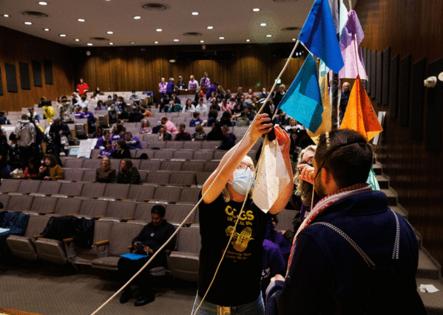Trump administration backtracks on revoking many international student visas
Published in News & Features
The Trump administration said it would reinstate hundreds of international student visas that were revoked over the last few weeks, a major policy reversal that follows a spate of lawsuits from students at U.S. universities across the country.
A Justice Department lawyer told a federal judge in Washington on Friday that the U.S. Immigration and Customs Enforcement agency will no longer change international students’ status due solely to checks against a national crime database, reading from a statement provided to Bloomberg by a student for the lawyers. ICE said it would restore any visas revoked due to those checks.
The administration canceled the visas of hundreds of international students at U.S. universities. More than 30 lawsuits have been filed on behalf of those students, some of whom denied ever committing a crime, despite being told they were flagged in the database. The Friday statement, which was first reported by Politico, was issued in response to one of those cases in Washington, though it is expected to apply to all of them.
Spokespeople for the Justice and Homeland Security departments didn’t immediately respond to requests for comment on the policy change.
Separately, in several high-profile legal fights, students have sued after being detained by immigration authorities for their involvement in pro-Palestinian activities. It’s not clear how the new policy will affect those cases, as many of those students had no criminal record. ICE said in its statement that it maintains the authority to terminate a student visa for various other reasons, including engaging “in other unlawful activity that would render him or her removable from the United States.”
The reversal comes a day after a federal judge in Connecticut blocked the deportation of dozens of international students from Yale University and other colleges was temporarily blocked by a federal judge, the latest legal setback for President Donald Trump’s immigration crackdown. Other courts had similarly halted student deportations.
U.S. District Judge Omar Williams on Thursday ordered the Immigration and Customs Enforcement agency not to deport the students or transport them outside Connecticut before he determined whether their student visas had been properly revoked.
Williams’ order came hours after four students at Yale and the University of Connecticut sued earlier Thursday, seeking to represent a class of at least 53 students statewide who allegedly had their visas illegally revoked without notice or a hearing. They said the U.S. had put them “in immediate danger” of being forced out of the country.
U.S. Secretary of State Marco Rubio has defended the revocation of student visas on foreign policy grounds, claiming that “every country in the world has a right to decide who comes in and who doesn’t.”
In their suit, the students said the visa terminations have “generated rampant distress and fear” and have interrupted on-campus research as well as students’ progress toward their degrees. “Students have been instructed to stop attending classes at a time when many students are trying to prepare for final exams, and many for graduation,” they said.
Courts have repeatedly expressed concern that the administration is moving to deport noncitizens without according them due process. On Friday, the American Civil Liberties Union asked a federal judge in Washington to order the return of all accused gang members deported to a notorious El Salvador mega prison, saying they were denied the chance to deny claims against them in a hearing.
The ACLU said Supreme Court’s recent decision requiring the Trump administration to “facilitate” the return of a Maryland man mistakenly deported with the accused gang members should be applied to the rest of the group. The request was made to U.S. District Judge James “Jeb” Boasberg, who is investigating whether Trump administration officials should be held in contempt for failing to comply with his March order to turn around the initial flights of deportees to El Salvador.
Since then, a number of courts have issued rulings restricting removals of accused gang members without giving them advanced notice and a chance to fight the claims. A federal judge in Colorado ordered ICE to give potential deportees in the state 21 days’ notice and advise them in a language they can understand how they can fight the claims.
©2025 Bloomberg L.P. Visit bloomberg.com. Distributed by Tribune Content Agency, LLC.







Comments